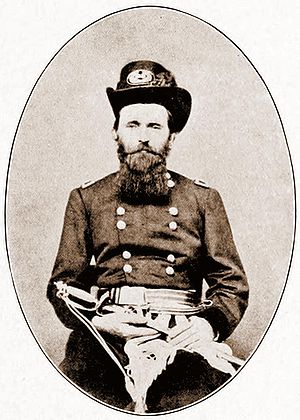 Image of Ulysses S. Grant via Wikipedia
Image of Ulysses S. Grant via WikipediaOn Wednesday, September 4, 1861, Brigadier General Ulysses S. Grant arrived in Cairo, Illinois, to take command of the Union forces there. Cairo was an important position near the confluence of the Mississippi and Ohio Rivers. It was Grant's first major command of the war.
Grant was appointed to the position by General John Frémont, the commander of the Department of the West. Frémont was a career officer in the U.S. Army, but he had come up and achieved nationwide fame through the Topographical Corps. If he had been a member of the West Point clique, he probably would not have chosen Grant for this important assignment.
Grant had been typed as a drunk and a drifter. At West Point, he developed a reputation as a poor student with bad study habits. He graduated in 1843, ranked 21st out of 39 cadets. He fought in the Mexican War, winning brevets for gallantry at Molino del Rey and Chapultepec, but after the war was posted at several remote garrisons where he fought boredom and loneliness by drinking. He resigned in 1854.
In civilian life, he moved from one failed venture to another. At one point, he was reduced to peddling firewood on the streets of St. Louis. When the war began, he was able to gain a position as colonel of the 21st Illinois Infantry only because Elihu Washburne, an influential congressman, took a liking to him.
Frémont also took a liking to him, describing him as as a man of "unassuming character not given to self elation, of dogged persistence, of iron will." It would be one of the best decisions of Frémont's troubled time in St. Louis. Grant arrived at Cairo and quickly began looking to counter the Confederate's position at nearby Columbus, Kentucky.
Also on this date, at Columbus, Confederate Major General Leonidas Polk issued a proclamation to the people of Kentucky, declaring that he had moved into Kentucky and occupied the town in order to protect it:
"The Federal government having, in defiance of the wishes of the people of Kentucky, disregarded their neutrality by establishing camp depots of armies, and by organizing military companies within her territory, and by constructing military works on the Missouri shore, immediately opposite and commanding Columbus, evidently intended to cover the landing of troops for the seizure of that town, it has become a military necessity, for the defence of the territory of the Confederate states, that the Confederates occupy Columbus in advance. The major-general commanding has, therefore, not felt himself at liberty to risk the loss of so important a position, but has decided to occupy it in pursuance of this decision. He has thrown sufficient force into the town, and ordered to fortify it. It is gratifying to know that the presence of his troops is acceptable to the people of Columbus, and on this occasion he assures them that every precaution shall be taken to insure their quiet, protection to their property, with personal and corporate rights."

No comments:
Post a Comment